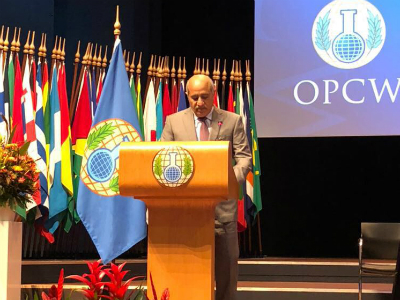Qatar Reaffirms Support for Joint Mechanism of OPCW, UN In Syria

The Hague / Information Office / November 28
The State of Qatar has affirmed its support for the continuation of the joint mechanism of the Organization for the Prohibition of Chemical Weapons (OPCW) and the United Nations in Syria until those responsible for the use of chemical weapons are identified and brought to justice.
It reiterated its commitment to its international obligations to maintain peace and security in the world, combat terrorism in all its forms and contribute to the stability, security and prosperity of humanity.
HE Sheikh Jassim bin Mohammed Al-Thani, The State of Qatar's permanent representative to OPCW, made the remarks at the 22nd session of the conference of the states parties to the convention on the prohibition of the development, production, use and destruction of chemical weapons in The Hague.
Since Qatar joined the Chemical Weapons Convention (CWC), HE Sheikh Jassim bin Mohammed Al-Thani said, it has a great effort in implementing all the articles of the convention and supporting its activities, adding that in implementation of Article 7, the National Committee for the Prohibition of Weapons (NCPW) was established in 2004 to be the body responsible for taking measures for the coordination, implementation and follow-up of the procedures of the convention inside the country and abroad.
In order to complete the legislative system, Qatar issued Law No. 17 of 2007 on the prohibition of chemical weapons, which was amended by Law No. 16 of 2013, HE the permanent representative said.
He pointed to the establishment of the Doha Regional Center for the Training of Conventions on Weapons of Mass Destruction in 2012 in cooperation with OPCW as the only center of its kind in the Middle East and the Asian continent, noting that Qatar organized through the center 26 programs in cooperation with the technical secretariat of OPCW. He expressed thanks to OPCW for its confidence in hosting and organizing these events.
HE Sheikh Jassim said that, since its establishment, the center has organized training and awareness activities at the national level for all sectors of the society, schools and universities students, workers in the chemical industries, chemical trade and civil defense companies, confirming that Qatar was a pioneer in education programs and external communication.
The Qatari official stressed that Doha shares OPCW its interest in planning for the future by supporting the activities of the next phase, which required the building of capacities in all areas of technology, chemical safety and security and the establishment of assistance and protection measures against chemical weapons, with the peaceful use of chemistry in the service of humanity through the application and activation of Article 11 of the convention.
HE the permanent representative expressed the State of Qatar's praise for the efforts and achievements of OPCW regarding the measures it took to destroy 96 percent of the world's chemical weapons.
He also expressed Qatar's appreciated of efforts to destruct the declared Syrian chemical weapons whether the chemicals or the production facilities, and for the associated verification and control mechanisms.
HE Sheikh Jassim bin Mohammed Al-Thani added that the Qatari delegation has been briefed onto the conclusions of the report of the OPCW fact-finding mission in Syria dated Nov. 2, 2017, which refers to the use of sarin as a chemical weapon in Al Lataminah village in Syria on March 30, 2017.
The Qatari delegation was briefed onto the joint investigation mechanism between OPCW and the United Nations, He said.
HE the permanent representative said Qatar condemns the use of chemical weapons, which represents a violation of the convention and the U.N. Security Council Resolution 2118 (2013), the resolutions of OPCW executive council, and all established international measures and foundations.
HE Sheikh Jassim bin Mohammed Al-Thani said that the unresolved issues regarding Syria's declaration and its related statements contained in the report of Oct. 4, 2017 by the director general of OPCW are still standing.
He reiterated Qatar's support to the director general to continue the work of the fact-finding mission in Syria and the assessment team of the organization until the executive council decides that all concerns regarding Syria's acquisition and use of chemical weapons are over.
The State of Qatar, he said, is asking the director general to keep the relevant information and to make them available to the United Nations General Assembly according to resolution 71/248 (2016) and the mechanism of inquiry for the implementation of its tasks, renewing Doha's invitation to the states that had not yet joined the CWC to do that so that international peace and security would prevail.
HE the permanent representative expressed the State of Qatar's ambition that all countries would entirely destroy the stockpiles of chemical weapons and build a world free of weapons of mass destruction, in which love, brotherhood and justice would prevail and the convention would become a symbol of peace and an example.
HE Sheikh Jassim bin Mohammed Al-Thani congratulated HE the Moroccan Ambassador Abdelouahab Bellouki for successfully heading the session, expressing his utmost trust of the ambassador's skill and capability to effectively contribute to the session. He also thanked HE Permanent Representative of the Federal Republic of Germany to the OPCW, Christoph Israng, for heading the previous session.
HE Qatar's permanent representative concluded by expressing Doha's gratitude and appreciation to HE OPCW Director General Ahmet Uzumcu and the technical secretariat team for their efforts to enhance the role of the organization in carrying out its tasks under the convention to the unanimous recommendation of the executive board of the organization.

